Brubaker Lighting Hitchcock Lighting
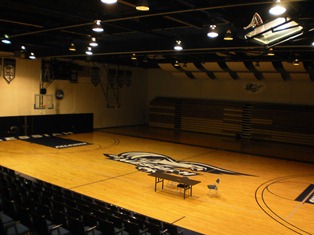
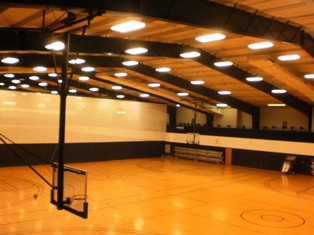
Replaced: 42-400W Metal Halide and 10-40W Replaced: 72-400W metal halide fixtures with
compact fluorescent with 54-(6) Lamp, 4', 32W, 72-(6) lamp, 4', 54W, T5HO, High-Bay
T8, high bay fluorescents. fluorescents.
Estimated cost decrease per year on 4,392 Estimated savings per year based on 4,392
hours @0.112 cents/kwh=$2800.00. hours @0.112 cents/kwh=$3,787.00. PPL (utility
Added Benefits: meets NCAA light level company) rebate applied for - $6,000 rebate
requirements, flexible use of space with estimated.
advanced control, eliminates additional fixtures
for emergency lighting - looks more uniform.
The annual cost savings to increase the lighting
levels by using T8 lamps in lieu of the additional
400W metal halide lamps at 4,392 hours per year
is $2,506.74.
Larsen Lighting Library Lighting
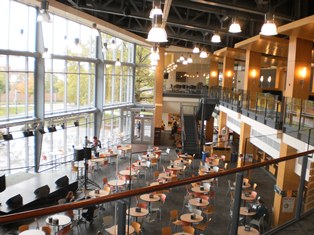
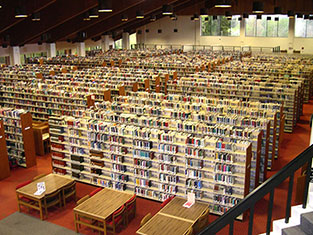
Added daylight harvesting system that Replaced approximately 30-400W metal halide
automatically controls the lights based on the fixtures with 30-multi lamp compact fluorescent
amount of sunlight that enters the room. (6 or 8) lamp, 55W and 42W respectively.
Estimated time to pay back the system Estimated savings per year based on 4,392
is less than three years. hours @0.112 cents/kwh = $6,400.00.
Added benefits: instant start with no delay with
light coming on, incorporates daylight harvesting
feature.
Lottie Lighting
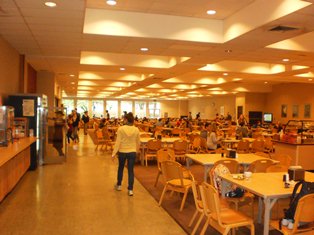
Replaced 156-150W incandescent (halogen) fixtures with 156-42W compact fluorescent.
Estimated saving per year based on 5012 hours @ 0.112 cents/kwh=$9,099.00
Added Benefit: Incorporates daylight harvesting feature, simple dimming control, longer lamp life, reduced maintenance costs. PPL (utility company) rebate applied for - estimated at $1960.00.
Old Main Rear Entrance Old Main Lobby
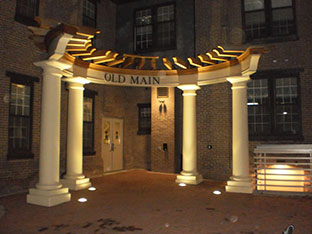
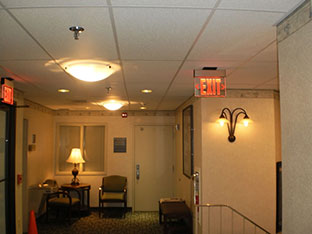
Solar Thermal System, North Complex
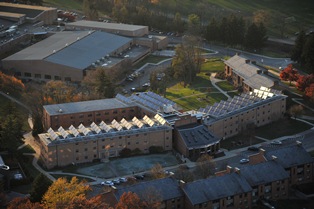
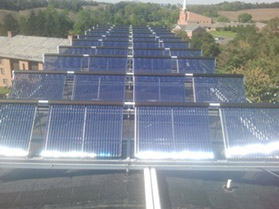
- The new heating system will reduce 788 tons of carbon emission each year as compared to the old electric heating system
- The reduction in carbon emission is equal to planting 3600 trees each year, or taking 130 passenger cars off of the street each year
- Two 3,000,000 btu/hr high efficiency boilers back up the solar thermal heating system.
- There are 116 solar thermal panels on top of the three buildings. Each panel has 30 tubes. There are a total of 3,480 solar thermal tubes on the North Complex
- Messiah’s solar thermal system is the largest in this region. It is the 4th biggest solar thermal system in the country
- The water that is heated from the solar thermal panels is stored in two 3100 gallon thermal storage tanks that are in an underground concrete vault in front of Hess Residences. The piping for the system holds an additional 1,600 gallons of hot water, for a total storage of 7,800 gallons
- The college made the decision to pursue a solar thermal heating system back in 2010 when our utility company stopped off peak special electric rates. Some of the infrastructure for the off peak heating with electricity was used with the new solar thermal plant.
- The college use to pay .03 cents per KWH to heat the North Complex with the old electric boilers. After deregulation, and the loss of special off peak electric rates the cost to heat the buildings went up to .115 cents per KWh. Almost an 380% increase in cost
- Last year the college spent $142,618.00 just to heat and provide domestic hot water for the North Complex.
- Last fiscal year the entire electric bill for the campus was over $2,657,000.00. The campus used over 23,000,000 KWh’s of electricity.
- This amount of electricity use is equal to: 86.4 Railcars of coal, electricity used in 1,978 family homes, the annual gas emission of 3,110 passenger vehicles, 1,778,002 gallons of consumed gasoline, 36,883 barrels of oil consumed.
- During peak summer performance the solar arrays will produce 5.6 million BTU output per day. This is equal to 1,641 Kilowatts.
Air Handling units with Recovery Wheel
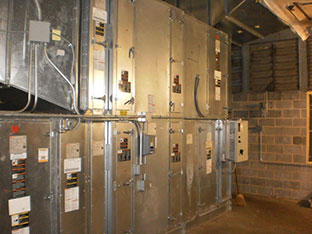
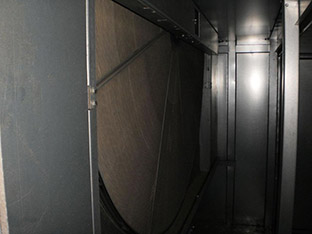
Air Handling Units with Recovery Wheels were installed where more than minimum outside air is
required. Recovery Wheels reduce outdoor energy cost by 60 to 80%. Paybacks are faster due
to energy savings.
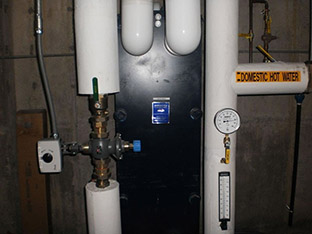
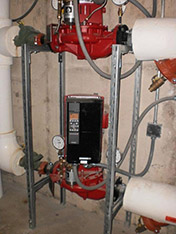
This Plate to Plate Heat Exchanger saves Variable Frequency Drives have been
750KW. These heat the pool water, domestic placed on pumps to reduce energy costs.
water and also supplies hot water coils to
eight Air Handling Units
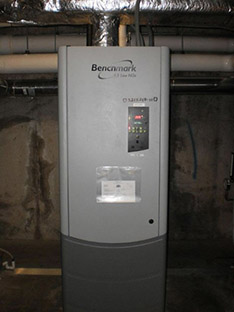
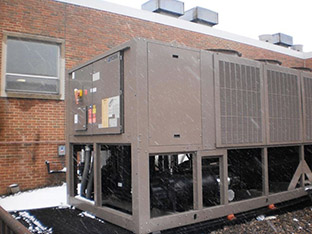
Three, two-million, BTU Boilers were We replaced a water cooled reciprocating unit
installed for a reduction of 750KW off and air-cooled unit with a York Latitude Screw
the electric grid.
Recycling Efforts
Messiah College recycles glass, aluminum, plastic (#'s 1-7), paper, cardboard, batteries, cell phones,
electronics and Styrofoam. The Styrofoam recycling was introduced to the campus two years ago. We
have collection sites throughout campus and within individual offices and residence halls. We currently
have two cardboard balers on site to create our own bales of cardboard which are then picked up by
our recycling vendor.
Densifying Unit Recycling Center
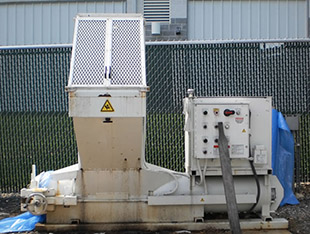
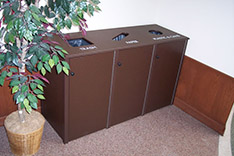
Recycling Bins
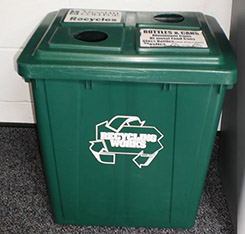
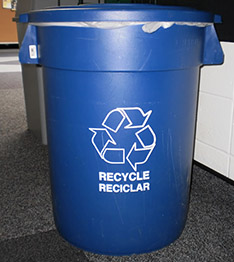
Messiah College partners with other organizations to reduce our waste -

Goodwill brings in one to two tractor trailers at the ends of semesters for students to bring any
unwanted items. This has diverted a lot of trash from the landfills and has helped countless
numbers of people in need. We also collect all unwanted food and donate these food items to a
local food bank.

Roman Catholic Diocese of Harrisburg, Catholic Charities USA, Mission Central and The Recycling
Network accept donations of mattresses and furniture from the college. These are items that are
no longer used by the college. This partnership again keeps these items out of landfills and helps
those less fortunate.
On Campus Composting
Messiah College started processing yard waste into compost in 2006. It is used in our flower beds,
on the athletic fields and at Orchard Hill in the yard and landscape.
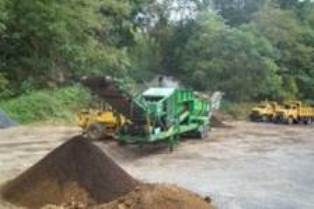

Woodchip Process on Campus
Messiah started it's own woodchipping process in 1997. Once a year all the downed trees, skids, tree
branches and brush are chopped into woodchips. This provides 200+ cubic yards of woodchips each
year. The woodchips are used in the natural areas, the fitness trail and walkways through campus.

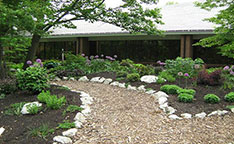
Pervious Asphalt
Construction of the pervious asphalt visitor's parking lot
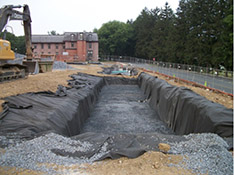
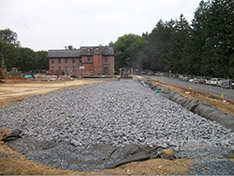
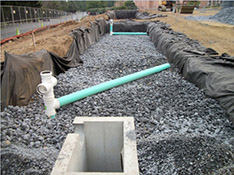
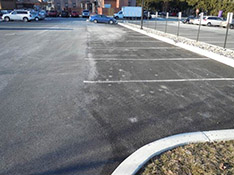
Pervious Asphalt helps control storm water management. There are 13 foot rock beds under the
pervious asphalt in the visitor's parking lot and the parking lot at Orchard Hill.
Storm Water Run-Off Correction
The college had a problem with storm water run-off in a ravine on campus Work was done to correct
this problem which included new drainage for that area.
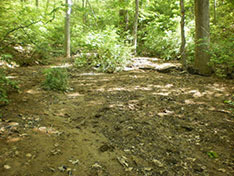
Storm damage before correction
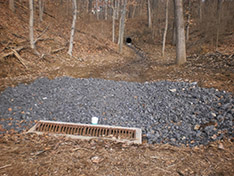
Storm drainage after correction